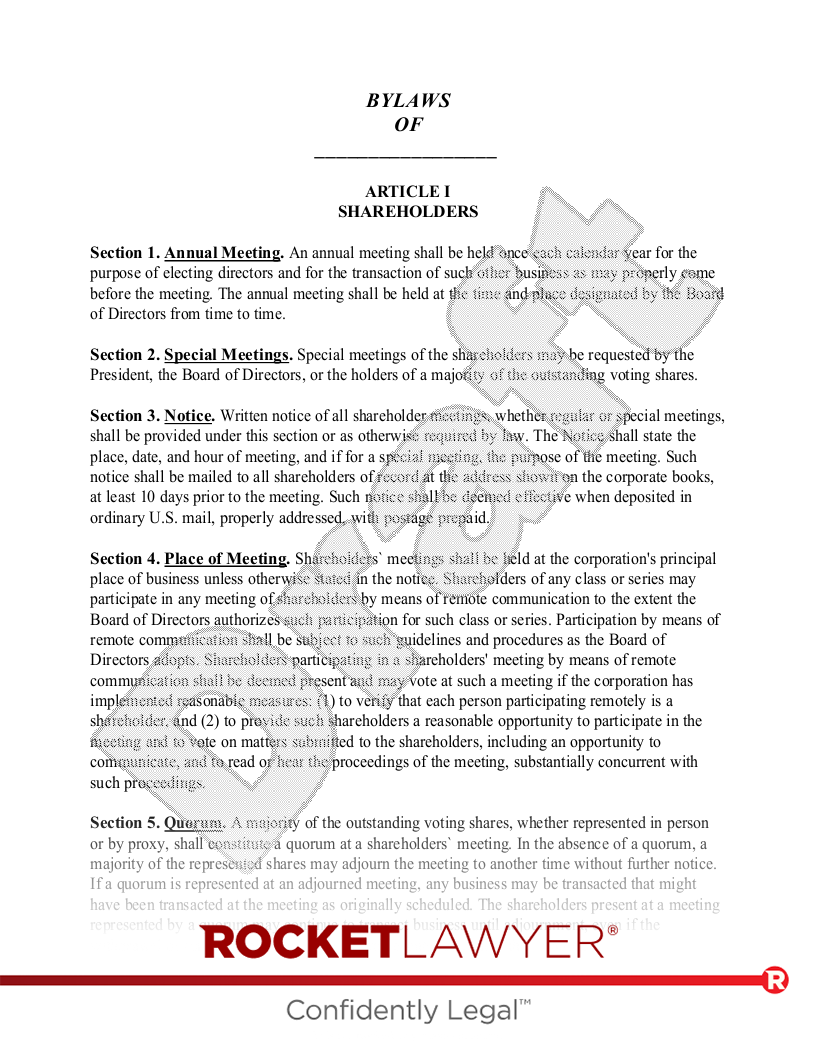What are Corporate Bylaws?
Corporate Bylaws provide the internal rules for your business. Unlike the Articles of Incorporation, which establish the bare essentials for the formation of a company, bylaws are more detailed. They set out guiding principles and specifically address the day-to-day operations of the business.
Bylaws are generally drafted and approved by a company's Board of Directors. For many small businesses, that means that you and your fellow owners will write the bylaws, perhaps with an attorney's help.
Do I need Corporate Bylaws for my business?
Not every business will need Corporate Bylaws. Some states do not require that you have them or that they be filed with the Secretary of State or another official office. For example, Alaska, Louisiana, Minnesota, and Utah do not require the creation of corporate bylaws, but California and New York laws require they be created and a copy kept at the corporation's principal place of business.
It is still a good idea to have Corporate Bylaws, even if they are not required. Bylaws provide basic information about the function and operation of your business. Having sensitive issues addressed at the outset of your company's development can help prevent conflict among owners down the road.
What is included in Corporate Bylaws?
The bylaws can be as broad or as specific as you like. Below are some of the most common terms and topics that are covered in a company's bylaws.
Name, Purpose, and Office Location
Bylaws will set out where the company is located and its name. The bylaws may also include an overarching purpose or mission statement. That mission statement will not only set out the company's purpose but also its values.
Members and Membership Terms
The bylaws will usually set out the specific names of members. In addition, it will spell out terms that directly affect membership. Some of the most common examples include:
- How members are chosen
- Whether and how members can be removed
- Procedures for disciplining members
- Types of membership
- Member voting rights
Some corporations do not have members. You can simply state that in your bylaws as well.
Board of Directors Information
The Board of Directors is the management body of the company. Rather than handling day-to-day operations, they provide high-level oversight and guidance. In general, corporations are required to have a Board of Directors.
The Board of Directors section in Corporate Bylaws will generally address:
- The number of directors
- How directors are selected
- Eligibility to sit on the Board of Directors
- The term length of anyone appointed to the Board of Directors
- Duties of the Board of Directors
Requirements to Hold Meetings
The bylaws should also specifically address how and when meetings will be held. The bylaws should address the process for setting annual, regular, and special meetings as well.
Amending the Bylaws
You should also set out how the bylaws can be changed down the road. While the bylaws may appear complete on the first draft, they may eventually need updates or changes. Your bylaws should outline a process to make those changes. In general, it is a good idea to revise your bylaws at least once every five years.
Procedures for Keeping Corporate Records
Your corporation is required to keep certain records, such as minutes and articles of incorporation. The bylaws may cover how those records will be prepared and kept to help ensure that your company maintains legal compliance with state laws. The bylaws may also address how members can access and inspect records.
Do I need a lawyer to write my Corporate Bylaws?
You do not need to have an attorney write your bylaws, but having a professional to help you might be a good idea. Every company has different bylaws, and each state has its own unique requirements about what should be included in this corporate document.
Rocket Lawyer provides the forms you can use to create bylaws on your own. If you would like to consult with an attorney about legal matters specific to your business and the documents you need to be in compliance with state laws, reach out to a Rocket Lawyer On Call® attorney for affordable legal advice.
This article contains general legal information and does not contain legal advice. Rocket Lawyer is not a law firm or a substitute for an attorney or law firm. The law is complex and changes often. For legal advice, please ask a lawyer.
